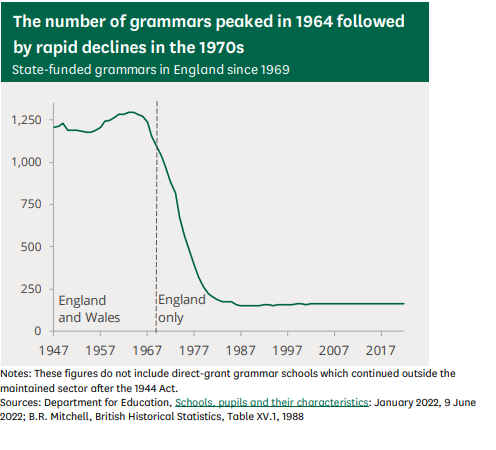
Looking Beyond Grammar Schools: An Overview of Secondary Education in the UK
05 Sept, 20248 Minutes
As a parent, it’s normal to put a lot of thought into your child’s education. You want them to have the absolute best set-up for their lives, ensuring they encounter excellent opportunities when completing their examinations and graduating from secondary school and university. As a doctor living in the UK, you’ve likely had your interest piqued by grammar schools as a way to enable your child to reach their full potential.
The UK secondary education system consists of state schools and private schools. Private schools are the ones you pay for, whereas state schools are free and funded by the state – as the name would suggest. Grammar schools are a type of state school where children must pass a specific examination for acceptance, called the 11+. Many parents wish for their children to attend a grammar school rather than a comprehensive one, as it’s viewed as a way to ensure academic achievement without paying a high fee. How much of this is true, though? If you’re a doctor in the UK wanting to learn more about the education system and grammar schools in particular, keep reading.
All About Grammar Schools
Grammar schools are a specific type of secondary school that accepts students ages 11-18. They differ from comprehensive schools as the admissions are not based on a catchment area, meaning you don’t need to live geographically close to the school to be let in. Instead, acceptance is based on passing the 11-plus, a standardised test taken by children in Year 6 when they are 10-11 years old.
To know why grammar schools are still popular, it helps to understand the ethos they were built on. Grammar schools were technically created in the mid-16th Century, but the type of grammar schools we know today began in 1944, towards the end of the Second World War. They were designed under the Education Act to offer a classical education to students who pass the 11+ test, focusing intensely on excellent academic achievement and discipline with the hope and assumption that all students would continue on higher education after graduating (university).
Of course, the educational and social landscape has greatly evolved since 1944, and grammar schools have undoubtedly been subject to controversy over the years due to their contribution to class division.
The Peak of Their Popularity
Grammar schools boomed in popularity between the late 1940s and the 1960s. Looking at this graph, you can see there were often over 1,000 grammar schools in the UK during these decades, with the peak reaching its highest point in the 1960s.

Found at URL: https://commonslibrary.parliament.uk/research-briefings/sn07070/
It made sense that grammar schools were so popular during this time. England was still in a post-war period in the late 1940s, and that gave people a newfound sense of hope and, along with that, high ambitions. Grammar schools were seen as a way to achieve greater, better things – parents wanted to send their children to grammar schools as they were seen as a way of excelling in academics.
As you can see from the graph, the number of grammar schools died down a little after the 1960s, which can be explained by the economic difficulties that were hitting the UK during this time. It makes it clear that the heyday of grammar schools was around 60 years ago and, naturally, many things have changed since then.
It’s important to note that grammar schools look different in the rest of the UK. Scotland used to have some grammar schools but have none today, whereas Wales has never had a Grammar school. Northern Ireland does have grammar schools.
Current Grammar Schools in the UK
Of course – as you’ll know looking into education for your children – there are still some grammar schools dotted around England. Currently, there are 163 grammar schools in England and 69 in Northern Ireland. When you compare this to how many there were in the 1960s (almost 1,300 at its peak), it shows that their numbers have seriously diminished over the years.
What about Comprehensive Schools?
There are around 24,000 state schools in the UK. Considering that only 163 of those are grammar schools, comprehensive schools provide the majority of education to students living in England, Wales, Scotland, and Northern Ireland.
Are Grammar Schools Still Popular?
The low number of grammar schools does not mean they aren’t still popular, especially with some parents. It makes sense when you consider the idea behind grammar schools – giving more disadvantaged children a chance to excel in their education. They are all about allowing high achievers to meet their potential by providing outstanding facilities and a high-achieving academic environment without the hefty price tag of a private school. Most parents in the UK cannot afford to spend around £15,000 per year on a private school, which is what makes grammar schools so appealing.
Of course, opinion is still split. While some parents still prefer the idea of a grammar school for their children, making sure their kids take the 11+ so that they may be admitted to one, others are not so sure. In fact, some people who used to be pro grammar schools are now changing their minds, including John Bercow, a former politician and Speaker of the House of Commons, who wrote:
“The Royal Latin, founded in 1423, the one grammar school in the constituency, seemed to me to be the embodiment of excellence and confidence.”
He later reflected on this perspective, stating:
“I came to see that 11 is far too young to select and that it is massively damaging to the self-esteem of the child.
“I used to subscribe to the myth that grammar schools were the great facilitator of opportunity for a bright working-class child. While that may have been true when Fred Perry – a great tennis hero of mine – went to grammar school in the 1920s, that is not the norm today.”
It seems that the introduction of grammar schools was to help children from working-class backgrounds achieve better things, but that was nearly 100 years ago.
 The Grammar School Debate
The Grammar School Debate
John Bercow isn’t the only one who disagrees with the fundamental idea of grammar schools. They are somewhat controversial, with many people seeing them as a way to divide children. The grammar school debate has been frequently discussed in politics, with shadow education secretary Lucy Powell highlighting that grammar schools only hinder equality. Even those who have attended grammar schools themselves have some negative things to say about them; in a piece on Oxford Student, Daisy Outram, a previous attendee of a grammar school, said that:
“I admit that my life will forever be shaped by my ability to guess some maths questions I didn’t understand at age eleven, but does that not show the deep flaws of the grammar school model?”
It’s clear that the reputation of grammar schools is anything but squeaky clean. Of course, there are people on the other side of the debate. The Conservative party has been more pro-grammatical schools than Labour, with many members of the party and their supporters believing in the positives that grammar schools can provide.
Selective Admissions: Not Always Advantageous
One of the downsides to grammar schools is the selective admissions. The 11+ exam can often be a source of considerable stress, both for the children and the parents. It’s a lot of pressure to put on a child so young and may end up causing more academic (not to mention emotional) harm than good.
On top of that, the 11+ exam does not always reflect a child’s potential. It’s one examination, after all, and there are so many different ways to understand a child’s ability, some of which may be far more reliable than a rigid test.
Then, there are comprehensive schools that take a more holistic approach to admissions. They aren’t based on a single test that the child takes at age 11 – instead, they are based on location and accept a diverse range of talents and backgrounds without the immense pressure of a high-stakes test. While parents who try to send their children to grammar schools undoubtedly do so because they want what’s best for them, it’s important to realise how negatively it can affect the child’s mental state during the admission period, especially if they fail the test, which can happen very easily, even for smart, capable children.
A Lack of Diversity in Grammar Schools
Another issue with grammar schools – and something that often comes up in the grammar school debate – is the lack of diversity in them. It’s an unfortunate truth that grammar schools have a much less diverse student profile compared to comprehensive schools that accept children from all backgrounds. A diverse school environment that brings together students from different socio-economic backgrounds and abilities is often much more advantageous to those who attend, as this is a better reflection of real life. School is about preparing a child for the world, and having a school that is more like the real world makes for better preparation.
Are Grammar Schools Better than Comprehensives?
As a doctor and parent who wants the absolute best for their child, you likely aren’t too interested in individual people’s opinions – it’s more about the facts and figures. That’s why the research on grammar schools from the University of London from 2023 is so interesting. According to their research, grammar schools do not provide a better opportunity for the brightest students in primary school. The findings showed that students who had the highest scores at age 11 and then went on to go to a grammar school were less likely to achieve five high-grade GCSEs compared to those who went to a comprehensive school.
That doesn’t necessarily mean that comprehensive schools are the key to the child’s success, either – it simply shows that a grammar school isn’t likely to give a child a better chance of finding success. There are many variables here, of course, but it’s important to note that many comprehensive schools lead to children doing very well, especially if they are already high achievers by the age of 11.
Should You Aim for a Grammar School?
This isn’t all to say that grammar schools are inherently bad, as it’s true that many grammar schools pride themselves on excellence and often produce good results. However, it’s crucial to be aware of the pitfalls, especially regarding diversity and the pressure put on children. It’s also helpful to understand that many comprehensive schools can set up children very well, offering a wide range of opportunities for them to excel and meet their potential.
Whether or not you should send your child to a grammar school or have them take the 11-plus test to see if they can get in is an entirely personal decision. It’s one that only you can make as a parent. The aim here is to make parents in the UK more aware of the reality of these schools – they aren’t a one-way ticket to absolute success and actually have many issues. We would suggest looking into both comprehensive and grammar schools in your area, keeping an open mind.
Final Thoughts
It’s undeniable that grammar schools have a historical reputation for academic excellence, with many parents still relying on this reputation with the expectation that a grammar school automatically means success for their children. However, regular comprehensive schools in the UK can be just as beneficial for students, offering a more broad, inclusive, and modern education that sets them up for the real world, as well as further education. A comprehensive school provides a balanced, supportive, and dynamic environment that prepares students for academic success and real-world challenges.
As a doctor in the UK, it’s understandable you want your child to find success like you did, but that doesn’t necessarily mean taking the grammar school route. Consider the advantages of comprehensive schools when making that all-important educational decision, and you may find your child flourishes and excels more than ever before.

